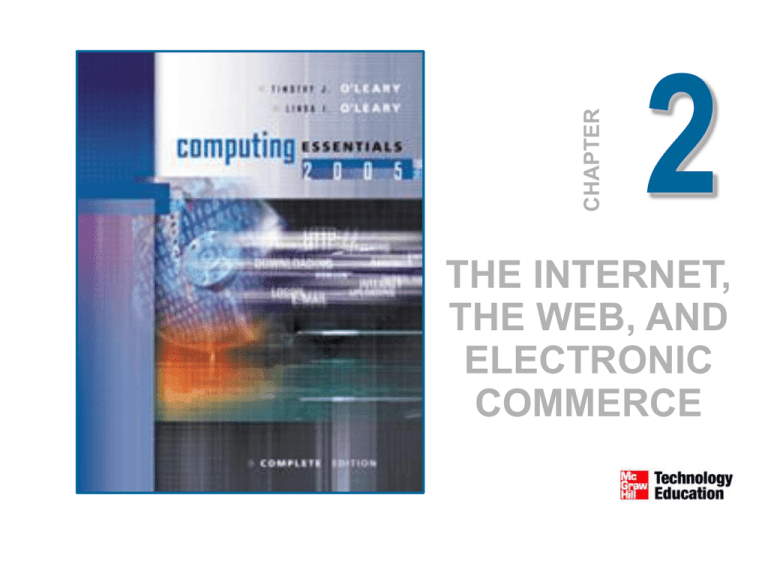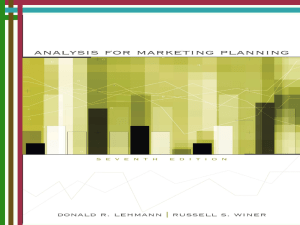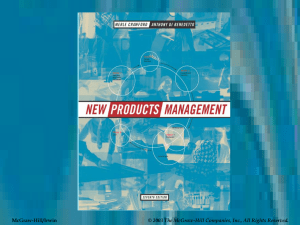
CHAPTER
2
THE INTERNET,
THE WEB, AND
ELECTRONIC
COMMERCE
2-2
Competencies
Discuss the origins of the Internet and the Web
Describe how to access the Web
Discuss Internet communications
Describe Internet search tools
Discuss electronic commerce
Discuss Web utilities
© 2005 The McGraw-Hill Companies, Inc. All Rights Reserved.
2-3
Internet or NET
Large network that connects smaller networks (cables , wires and
satellite)
Launched in 1969
National computer network project of united states called Advanced
research project agency network (ARPANET)
US funded project called ARPANET
World Wide Web (WWW) was introduced in 1992 at CERN
(Center for European Nuclear Research) in Switzerland.
Web is a multimedia interface to resources available on the
internet
Web ≠ Internet
© 2005 The McGraw-Hill Companies, Inc. All Rights Reserved.
2-4
Common Internet Applications or uses
Communicating
Exchange e-mail
Chat
Create your own webpage
Shopping
Searching
Entertainment
Education or e-learning
© 2005 The McGraw-Hill Companies, Inc. All Rights Reserved.
2-5
Access Providers
The most common way to access the internet
is through a provider or host computer
(university is provider which provide path or
connection)
How to get “online” (connected to Internet)
Commercial Internet Service Providers (ISP)
National(AOL: America online, telephone
connection, inside the country , standard fee
Regional (telephone connection, several
states , standard fee+long-distance connection
charges)
Wireless service providers (wireless modems
© 2005 The McGraw-Hill Companies, Inc. All Rights Reserved.
2-6
Connection Technology
Dial-up , DSl, cable and wireless modems.
User computer is a Client that request services
from the provider computer or Server
© 2005 The McGraw-Hill Companies, Inc. All Rights Reserved.
2-7
User Connection Costs & Speeds
Type
Fee
Speed
Seconds to Get
Images
Dial-up
$16
56 kbps
45.0
DSL
50
1.5 mbps
1.7
Cable Modem
40
1.5 mbps
1.7
Satellite
70
900 kbps
2.8
© 2005 The McGraw-Hill Companies, Inc. All Rights Reserved.
2-8
Web Browsers
Programs that provide access to Web resources
Allow you to surf the Internet
Two well-known browsers
Netscape Navigator
Microsoft Internet Explorer
Address or location of the resource must be
specified
© 2005 The McGraw-Hill Companies, Inc. All Rights Reserved.
2-9
URLs
For browser to connect to resources, the location or address of
the recourses must be specified. These addresses are called
uniform resource locator.
Uniform Resource Locator
All URLs have at least two parts
Protocol (rules for exchanging data between computers)
Domain name (name of the server where the resource is located)
Code name (identify the type of organization :org. com. Edu.
Locates Web sites (= address)
protocol
domain code
http://www.google.com
domain name
Note: ftp://
© 2005 The McGraw-Hill Companies, Inc. All Rights Reserved.
2-10
More on Browsers
Web site is the informational location.
Once browser has connected to the web site , a document file is sent back to
your computer. This document contains HTML commands. The browser
interprets the HTML commands and displays the document as a webpage.
Browsers interpret HTML commands
Hypertext Markup Language
Contained in a document
Browsers display html documents as Web pages
Web server: page presents information about the site with references or links
that connect to other documents. The computer that contains or share these
document is called Web server.
© 2005 The McGraw-Hill Companies, Inc. All Rights Reserved.
2-11
Communication
Most popular Internet activity
Two types of Internet communication
E-Mail
Discussion Groups
© 2005 The McGraw-Hill Companies, Inc. All Rights Reserved.
2-12
E-Mail or Electronic Mail
Transmission of electronic messages over the
Internet.
At one time Email consisted only of basic text
message, now graphics , images , attachments
Connect to internet, open email program.
Two of the most widely used email program are
Microsoft’s outlook express and Netscape's mail
© 2005 The McGraw-Hill Companies, Inc. All Rights Reserved.
2-13
© 2005 The McGraw-Hill Companies, Inc. All Rights Reserved.
2-14
Parts of E-mail
Basic parts
Header
Address
Subject
Attachment
Message
Signature
Unwanted emails
=spam
Cc stands for carbon copy which means that whose address appears after the Cc: header would receive a copy of the message. Also,
the Cc header would also appear inside the header of the received message.
Bcc stands for blind carbon copy which is similar to that of Cc except that the Email address of the recipients specified in this field
do not appear in the received message header and the recipients in the To or Cc fields will not know that a copy sent to these
address.
© 2005 The McGraw-Hill Companies, Inc. All Rights Reserved.
2-15
E-Mail Address
The server providing the email service for the user
is use.edu
The domain code indicates that the provider is an
educational institution.
© 2005 The McGraw-Hill Companies, Inc. All Rights Reserved.
2-16
Discussion Groups to share ideas and interest
Mailing lists (subscription address)
Fig 2.9
Newsgroups (special networks of
Fig 2-10
computer called Usenet (fig 2-10))
Chat groups (internet relay chat)
IRC
Instant Messaging (IM)
© 2005 The McGraw-Hill Companies, Inc. All Rights Reserved.
2-17
Discussion Group Terms
Term
Description
Flaming
Insulting, putting down, or attacking
Lurking
Reading news but not joining in to contribute
RFD
Request for discussion
Saint
Someone who aids new users by answering questions
Thread
A sequence of ongoing messages on the same subject
Wizard
Someone who has comprehensive knowledge about a
subject
© 2005 The McGraw-Hill Companies, Inc. All Rights Reserved.
2-18
Search Tools
search services locate information, database
Search provider operate website that can help you
locate the information you need.
Agent, spiders or bots: are special programs look for new information and
update the search services databases.
Search engines (special software assist you in locating
information
Metasearch engines
Specialized search engines
Fig 2-17
© 2005 The McGraw-Hill Companies, Inc. All Rights Reserved.
2-19
Search Engines
Specialized programs to assist you in locating
information on the internet
search services website
Types of searches
Keyword search
Match or compare with database
Directory search
Categories or topicse
General informationSearch engine
Fig 2-13
© 2005 The McGraw-Hill Companies, Inc. All Rights Reserved.
2-20
Metasearch Engines
Visit the web sites for several individual search engines.
Programs that automatically submit your search request to
several search engines.
The metasearch engine receives the result and order the hits and
provide the edited list to you
© 2005 The McGraw-Hill Companies, Inc. All Rights Reserved.
2-21
Metasearch Engines
Metasearch Service Site
Dogpile
www.dogpile.com
Ixquick
www.ixquick.com
Mamma
www.manna.com
MetaCrawler
www.metacrawler.com
ProFusion
www.profusion.com
Search
www.search.com
Vivisimo
www.vivisimo.com
© 2005 The McGraw-Hill Companies, Inc. All Rights Reserved.
2-22
Electronic Commerce
Known as e-commerce
Buying and selling of goods over the Internet
Three basic types of electronic commerce:
Business-to-consumer (B2C)
(e-banking, e-trading)
Consumer-to-consumer (C2C)
(web auction)
Business-to-business (B2B)
(computer , automobile parts
© 2005 The McGraw-Hill Companies, Inc. All Rights Reserved.
2-23
Web Storefronts
(program)
Virtual stores
Web storefront creation packages
Help businesses create virtual stores
Allow visitors to register, browse, and make
purchase
Also called commerce servers
© 2005 The McGraw-Hill Companies, Inc. All Rights Reserved.
2-24
Web Auctions
Consumer-to-consumer e-commerce
Similar to traditional auctions
Types
Auction house sites
Sell a wide goods to bidder directly, save place to shop
Person-to-person auction sites
Numbers of buyers and sellers .be careful
© 2005 The McGraw-Hill Companies, Inc. All Rights Reserved.
2-25
Security
Payment methods must be fast, reliable, and
secure
Three basic options
Checks
Credit card
Electronic cash page 45
E-cash
Cybercash
Digital cash
© 2005 The McGraw-Hill Companies, Inc. All Rights Reserved.
2-26
Web Utilities
Telnet
FTP
Plug-ins
Filters
Plug-in
Source
Acrobat
Reader
www.adobe.com
Media Player www.microsoft.com
QuickTime
www.apple.com
RealPlayer
www.real.com
Shockwave
www.macromedia.com
© 2005 The McGraw-Hill Companies, Inc. All Rights Reserved.
2-27
A Look to the Future
Internet2
A high bandwidth project for media-intensive
files
Collaboration of universities, the government,
and private industry
100 times faster than the Internet
Not a separate Internet
© 2005 The McGraw-Hill Companies, Inc. All Rights Reserved.
2-28
Key Terms
address (32)
Advance Research
Project Agency Network
(ARPANET) (30)
agent (40)
applet (33)
attachment (34)
auction house site (44)
bot (40)
browser (32)
buddy (36)
business-to-business
(B2B) (43)
business-to-consumer
(B2C) (43)
cable (32)
carder (44)
Center for European
Nuclear Research
(CERN) (30)
© 2005 The McGraw-Hill Companies, Inc. All Rights Reserved.
2-29
Key Terms
channel (36)
chat group (36)
client (32)
client-server network
(32)
commerce servers (43)
computer virus (34)
contact (36)
consumer-to-consumer
(C2C) (43)
cybercash (44)
cybermall (30)
dial-up (32)
digital cash (44)
directory search (69)
discussion group (36)
domain code (32)
domain name (32)
downloading (46)
© 2005 The McGraw-Hill Companies, Inc. All Rights Reserved.
2-30
Key Terms
DSL (32)
e-cash (44)
e-commerce (42)
e-learning (30)
electronic cash (44)
electronic commerce (42)
electronic mail (34)
e-mail (34)
file transfer protocol
(FTP) (46)
filter (45)
friend (36)
header (34)
hit (40)
host computer (31)
hyperlink (33)
Hypertext Markup
language (HTML) (33)
© 2005 The McGraw-Hill Companies, Inc. All Rights Reserved.
2-31
Key Terms
index search (40)
instant messaging (IM)
(36)
Internet (30)
Internet Relay Chat
(IRC)(36)
Internet Service Provider
(ISP) (32)
Java (32)
keyword search (40)
link (33)
list address (36)
location (32)
lurking (37)
mailing list (36)
message (34)
metasearch engine (41)
national service
provider (32)
Net (30)
newsgroup (36)
online (30)
© 2005 The McGraw-Hill Companies, Inc. All Rights Reserved.
2-32
Key Terms
person-to-person auction
site (44)
plug-in (46)
protocol (32)
provider (31)
regional service provider
(31)
search engine (40)
search provider (40)
search service (40)
server (32)
signature line (34)
spam (34)
specialized search engine
(429)
spider (40)
subject (34)
subscription address (36)
© 2005 The McGraw-Hill Companies, Inc. All Rights Reserved.
2-33
Key Terms
Surf (32)
Telnet (46)
Uniform resource locator
(URL) (32)
uploading (46)
UseNet (36)
virtual library (30)
Web (30)
Web auction (43)
Web page (33)
Web server (33)
Web site (33)
Web storefront (43)
Web storefront creation
package (43)
Web utility (45)
wireless modem (32)
wireless service provider
(32)
© 2005 The McGraw-Hill Companies, Inc. All Rights Reserved.
2-34
Key Terms
World Wide Web (30)
WWW (30)
© 2005 The McGraw-Hill Companies, Inc. All Rights Reserved.
2-35
FAQs
What is the difference between the Internet and
the Web?
What is an ISP?
What type of program is Microsoft Internet
Explorer?
I want to shop for items using the Internet. How
do I pay for my purchases?
What are the advantages of Internet2?
© 2005 The McGraw-Hill Companies, Inc. All Rights Reserved.
2-36
Discussion Questions
Discuss the history of the Internet.
List the Internet Service Providers (ISPs) that are
available in your area.
Describe the advantages of using Instant
Messaging (IM).
Explain the differences between search engines
and metasearch engines.
Explain how to use a Web auction.
© 2005 The McGraw-Hill Companies, Inc. All Rights Reserved.





